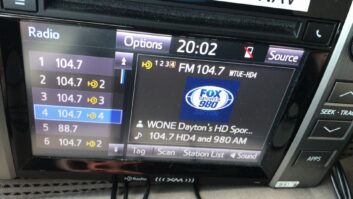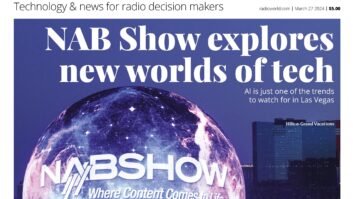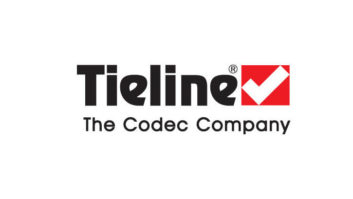SAN ANTONIO As Clear Channel’s top capital investment man, Bill Suffa has a great deal of input as to whether the huge radio group will adopt IBOC.
From a financial viewpoint, he’s not convinced.
William Suffa is the senior vice president of capital management for Clear Channel Worldwide. As such, he plays an important role in determining when and how Clear Channel stations will make the digital transition and how much money those facilities will have available to accomplish the change.
Suffa, 45, has done a little bit of everything in radio, from engineering and on-air work to sales. He’s a ham operator, he flies a small plane and he once worked for the FCC as a field agent. He combined his skills in engineering and financial analysis to form a broadcast and telecommunications consultancy; he served as a vice president of strategic development for the former Jacor Communications and then for the radio division of Clear Channel Communications.
With approximately 1,200 stations, plus Internet, outdoor, entertainment and international divisions, Clear Channel has the most stations of any group owner in the United States and holds a stake in radio’s future with its investments in companies developing both satellite and terrestrial digital radio. Suffa manages an annual capital budget in excess of $500 million overall.
Radio World News Editor/Washington Bureau Chief Leslie Stimson spoke with Suffa about his views on digital radio and on emerging technologies that could compete with radio in the car. He also spoke about Clear Channel’s use of voice tracking and the effects of consolidation on radio.
RW: Are your stations now in the process of figuring out what equipment they’re going to need for in-band, on-channel digital audio broadcasting?
Suffa: The whole IBOC thing is one of economics. I don’t know that they are. I know certainly, in a couple of markets, we’ve taken a look at it because we want to make some assessment of the cost exposure and determine whether and when it’s something we want to do. But from a financial basis, it’s very difficult to justify going to IBOC at this time.
RW: Are we talking about whether there’s a clear path to a return on investment?
Suffa: Yes, we are. We’re talking about return on investment. We’re talking about a situation where there are – and Bob Struble will argue with me, Charlie Morgan will argue with me – but the fact of the matter is, there are no receivers out there. (Struble is president and CEO of Ibiquity Digital Corp.; Morgan is chairman of the National Radio Systems Committee.) …
Broad ExperienceBill Suffa is senior vice president of capital management for Clear Channel Worldwide. He manages the capital spending and management of the physical assets for Clear Channel’s subsidiaries, including its radio, television, outdoor, international and entertainment divisions.
Prior to joining Clear Channel’s corporate office, Suffa served as vice president of strategic development for Jacor Communications and Clear Channel’s radio division.
Suffa was a founding principal in the broadcast and telecommunications consulting firm of Suffa & Cavell and its predecessor firm. He has worked as an FCC field agent in New York, on the air and in sales for various small-market stations. He began his radio career at the Virginia Tech student station, WUVT(FM), Blacksburg, Va.
He holds an undergraduate degree in electrical engineering from Virginia Tech and a Masters of Business Administration from George Washington University.
Clear Channel is very interested in return to our shareholders. And it’s very, very difficult to justify purchase of this kind of equipment where we don’t see the clear return.
We don’t see it, particularly in the short term. You’re looking at some substantial money for the equipment, for the license fees or, depending on whether the commission were to accept the argument on daytime-only AM, the possible economic dislocation of a part-time digital signal.
The flip side, of course, is sales.Is there something we could use to add a promotional benefit to group sales at the station? Is there some sort of ancillary revenue stream that we could sell to recoup some of the costs of this?
The long-term strategic question is what happens with the likes of XM, Sirius and the potential for digital wireless broadband and telematics – even potentially the music industry getting their act together on the ability to download music into portable devices. …
Really what we’re talking about is, is there a direct return on investment from going digital? No. From where I sit, the direct return would be something like an ancillary data service, something using a data channel. The real return is one of a lost opportunity cost – in other words, a loss of what we’ve got now chipped away by all these other competitors. If we’re the only non-digital medium, can somebody else chip away at that?
RW: What about AM IBOC? The NRSC so far approved digital for daytime only while Ibiquity plans to conduct nighttime tests for groundwave and skywave conditions. Ibiquity is proposing to the FCC that AM stations operate with IBOC during the day only at the start of the transition.
Suffa: Daytime-only digital AM will put AM at a severe economic disadvantage relative to both FM and other media.
What you need to keep in mind is that nighttime hours in many parts of the United States, during the winter, start before or during evening drive. It lasts into morning drive. Capturing those dayparts is critical to the success of AM, especially given that the main use of AM, right now, is information-based services. …
The other risk – with great compliments to the commission for bringing this rule making to a head quickly, the fact is that regulatory processes traditionally are lengthy. They’re lengthy because you’re establishing a standard. You want it to be a broad-based standard. You want it to endure. You don’t to have to come back and do it again because people are going to start to build radios and build equipment to meet this standard. …
As a broadcaster, (with) a company that derives still a significant portion of revenue out of the AM band, I want to see as much attention paid to making AM work and improving AM as I do to anything else.
RW: Do you think the solution for the AM technical problem might be to skip the hybrid phase and just go to the all-digital mode?
Suffa: I don’t know that that’s a solution, because what do you do in the transition period? That might work for a number of stations that are just not economically viable now. But if you look at a big station … there still is a compelling revenue stream, still a very viable station.
Shutting that off and converting to digital, particularly when there are no radios out there, or where radio penetration is very low, is something I think a broadcaster and a businessman is not likely to make the decision to do.
RW: How does it sit with you that Ibiquity wants to audit stations’ books twice a year to make sure they’re reporting revenue from the ancillary data? Is Clear Channel going to put up with that?
Suffa: I have reservations about extraordinary amounts of audits and record keeping and all the rest of it. … I think what (Ibiquity’s) smart enough to realize is that if the fees are too high or the burden is too high, then the broadcasters will just say, “Pft! … We’re not going to do it.”
At the moment, we do record keeping for public reporting purposes. We do record keeping for management purposes. … I would be surprised if Ibiquity goes out and tries to audit every station twice a year.
RW: So perhaps that language (in the agreements) is boilerplate, but doesn’t necessarily mean they would do it…
Suffa: It’s pretty common in certain business contracts to have a means of doing an audit. … I haven’t seen final language out of Ibiquity yet. Depending on what that is, if it’s benign, if it’s appropriate from a business sense, I think we’ll be OK with it. If it’s overbearing and burdensome, it’s something we’re not going to be OK with, and either we address it through negotiation, or, in the absolute worst case, we just don’t do any data at all.
RW: Is Clear Channel still in talks with Ibiquity about its license fees?
Suffa: I don’t think the fee issues have been settled. Most of that’s taking place within our radio group as opposed to at my level.
RW: Do you think Ibiquity will budge on waiving or delaying the licensing fees for stations that transition early?
Suffa: I don’t that’s been resolved yet. We’re still early in the game. There’s still really not equipment out there. We’re talking to Ibiquity. The other broadcasters are talking to Ibiquity. Ibiquity’s talking to people.
Frankly, anytime you put out a new product or a new form of revenue stream, it will take a bit of time to get the fees right. When you’re doing it by contract, as opposed to market force, it’s a little different. If you go out and put a new product on the market and nobody buys it because it’s priced too high, then you can lower the price quickly.
When you do something by contract, then it takes longer. …
Ultimately it will take some time to get the fees right with respect to the value it brings to the media, to us, the broadcaster, vs. the expectations of Ibiquity. I think it’s going to take some time to get that right.
RW: You mean in the equipment investment you need to do…
Suffa: The whole thing. The licensing fees are not a capital item. They are, in fact, an operating cost.
Our stations in the markets are sensitive to operating costs. The economic reality of Clear Channel is that our managers are measured on their operating performance, effectively their operating profit. That measurement means that they can improve the profit really one of two ways: one is to improve revenues, and two is to reduce operating expenses.
RW: As in voice tracking.
Suffa: I’m happy to go there because there’s a lot of misunderstanding out there about it.
RW: It’s a way for your stations to reduce their operating costs quickly?
Suffa: Voice tracking is a much about quality as it is about cost savings.
I’ve heard a lot of squawking by old radio people and by others who just don’t understand it about voice tracking. But those same people are ignoring the fact that 20-something years ago there was automation. …
RW: But what about the charges that people lose their jobs because of the practice?
Suffa: Voice tracking, it’s not a panacea. The method we use, which is a networked method, it helps us to reduce the risk of bad programming.
In some sense, it helps us to reduce the safety risks. If you’ve got a station where the studio’s in a bad neighborhood, we can effectively run that programming remotely and you don’t have to have a female worried about walking to her car across the parking lot at night when she leaves the station. She can lay down those voice tracks while it’s still light and leave the station.
It improves our ability to be responsive in a national emergency. On Sept. 11 and the days afterwards, it offered us a fabulous opportunity to share our best programming of our best stations, to distribute the programming, and to really be responsive to the public.
RW: So, even though some jobs are lost –
Suffa: There may be some jobs lost. There may be some jobs added somewhere else. It may be that we lose some jobs on the air talent side, but we add some sales jobs. … The fact is it keeps it clean, a clear, consistent air product.
If you go to a Chili’s or McDonald’s, a Safeway, you know, generally, what you can expect. You can expect clean aisles, a staff that’s responsive, you can expect a core product base with different modifications to the product depending on what market you’re in. …Voice tracking really is no different. It’s about getting a higher-quality product, a consistent product, market to market, and I think, largely, that helps us to accomplish it. It makes radio a much more credible media.
RW: What does your job entail?
Suffa: The title is senior vice president of capital management. What that means is I get to manage the worldwide capital investment budget for Clear Channel in all our divisions. By capital investment I mean capital assets.
Anytime you spend capital of any kind, it’s making an investment for the future. If you buy an asset, if you buy a transmitter or a truck, or whatever that’s a capital asset, you expect it to provide some return to your bottom line in some fashion. …
I keep abreast of (technologies) to help improve efficiencies for Clear Channel. Part of the job is to try to mitigate risk, while we encourage our units to make investments that will yield excellent rates of return.
You can get that yield either through the investment directly, which would be doing something like building a new amphitheatre for our entertainment group or winning a contract to put advertising structures in a supermarket chain … or through a strategic investment that helps us to protect and improve our existing properties. Digital radio falls into that category.
What we want to do is to make investments that give us good return, but we also want to do it while mitigating risk. I think the Internet boom certainly showed how risky certain kinds of investments might be.
RW: Clear Channel has invested in both satellite radio and IBOC development. Is that hedging your bets, or just being careful?
Suffa: It’s some mitigation of risk. We don’t want to take all the risk, so we often get into businesses where we have partnerships or we make strategic investments with our money in things that will yield us good rates of return.
We’ve got an investment in Hispanic Broadcasting. We have a position in XM Satellite Radio. We’ve got a position in the IBOC group. Some of our international groups are partnerships, where, for one reason or another, we can’t own a radio station outright in a country, or where it makes more sense.
If you’re going into a riskier country typically you want somebody in the country, preferably somebody who’s taking an active role in management to have an interest too, so that they’re on the hook for it.
RW: Will satellite radio succeed?
Suffa: It’s a marketplace issue, a marketing issue.Is there enough different, compelling content? Will people pay for subscriptions to both?
My guess is probably not. But we’re still early in the curve. … We’d like to see our investment pay off. I think in the long run, it will.
RW: How are equipment purchases handled by Clear Channel?
Suffa: We establish a capital budget at the corporate level. We establish it for each division. … Some is for maintenance and replacement purposes. Some of it is for the major projects, the consolidation projects …the big projects like relocating a facility. Some is for what we call new revenue generating. …
I give each of the groups numbers and work with them on meeting those numbers. The specifics of the purchases, for the radio group, it’s handled by Steve Davis out in Tulsa. … What typically happens is he makes requests; he goes out to the field. They request items that come up to him, and depending on a number of factors, they get approved or disapproved. Part of it is to fit in the budget. Part of it is whether the station really needs it or not.
RW: When your stations make the transition to IBOC, how will those equipment purchases be handled?
Suffa: Some of that’s going to come down on Steve Davis. There are some good technical reasons to buy common pieces of equipment. However, having said that … that will be something that’s decided in the radio group.
From the corporate level, I’m not going to tell them they have to buy one or the other. I’m going to make the deal available.
It’s no different than we do with other deals. We make the deal available to them and tell the markets, ‘If you can find a better deal, and it meets your needs, and you meet the other criteria that’s laid out, then you have some latitude in making a decision.’
RW: What technological trends do you foresee for radio in the next few years?
Suffa: We’ll see a move towards digital. I think you’ll continue to see the studios become more digital. There’s very little analog in the studios, although (analog) consoles are still there for cost factors as much as anything else in the use of older equipment. I think you’ll continue to see more digital automation.
A better product allows you to be much more creative.
You’ll see integration of the traffic and billing system to allow better network selling for national placement. You’ll see more use of it for cross-platform sales.
Today, look at the situation a national advertiser is in. He might get 50 invoices he places on 50 stations, or 60 stations might get 40 or 50 invoices out of it. He doesn’t have a good way of getting proof of performance on that.
I think you’ll see us working more towards resolving those kinds of issues because they’re a way of getting more revenue without altering the air product.
Streaming is up in the air; and wireless broadband ties into streaming because the models they’ve been looking at are ones that are effectively streaming audio across a broadband connection. A lot of that will be driven by the CARP fight, the economics of it. It’s cost-intensive at the server end. In terms of fixed placement to the desktop, broadband is becoming more the way of life, but that’s not a mobile environment. …
It doesn’t get into a lot of workplaces because a lot of companies are saying, “Hey, wait a minute, that’s eating up a lot of bandwidth we’re paying for.” We need to keep an eye on wireless broadband. But there are a whole host of economic issues, including the cost model for transmission. … If they charge per byte for delivery costs, the wireless broadband model, then it may be difficult to get a high-quality audio product. …
Record companies – if they can get their act together on downloading music, and at the same time not make the copy protection so stringent that the listener has no flexibility, there is a possibility that MP3 and other players could have an impact. But, again, that gets back to, it’s not local and it’s nowhere near live. It doesn’t even approach voice tracking. …
The listener wants some information, whether it be weather, traffic or sports and news. That’s awfully hard to deliver over an MP3 kind of product.












